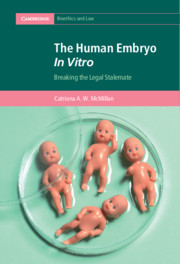Book contents
- The Human Embryo In Vitro
- Cambridge Bioethics and Law
- The Human Embryo In Vitro
- Copyright page
- Dedication
- Contents
- Foreword
- Acknowledgements
- Table of Cases
- Table of Legislation
- Abbreviations
- Introduction
- Part I Into Liminality
- Part II Through Liminality
- 4 Navigating Legal Purgatory
- 5 A Liminal Lens
- Part III Out of Liminality
- Bibliography
- Index
5 - A Liminal Lens
from Part II - Through Liminality
Published online by Cambridge University Press: 18 March 2021
- The Human Embryo In Vitro
- Cambridge Bioethics and Law
- The Human Embryo In Vitro
- Copyright page
- Dedication
- Contents
- Foreword
- Acknowledgements
- Table of Cases
- Table of Legislation
- Abbreviations
- Introduction
- Part I Into Liminality
- Part II Through Liminality
- 4 Navigating Legal Purgatory
- 5 A Liminal Lens
- Part III Out of Liminality
- Bibliography
- Index
Summary
This chapter introduces liminality, an anthropological concept, before going on to explain why human embryos may be described as liminal beings. As an entity in a state of constant and rapid change, embryos sit ‘betwixt and between’ the various realms of legal categorisation. As such, the core problem for law is two-fold: ‘the embryo’ has neither a fixed status, nor is it possible to ‘fix’ its status. Law, accordingly, struggles to capture and regulate what embryos are ontologically (as opposed to what the ‘embryo’ is descriptively). The challenge in capturing these ontologies is perhaps part of the problem; if, indeed, this is what law has sought to do. This chapter argues that an embrace of liminality - both as a state embryos are led into, and as a lens for analysing that state - fully reveals the multiplicity of contexts in which embryos are used and created. This chapter shows that a liminal perspective demonstrates that there are vital aspects of embryos - some of which the law itself creates - that the law might better recognise, namely its contextually variable and relational qualities
Keywords
- Type
- Chapter
- Information
- The Human Embryo In VitroBreaking the Legal Stalemate, pp. 117 - 148Publisher: Cambridge University PressPrint publication year: 2021

